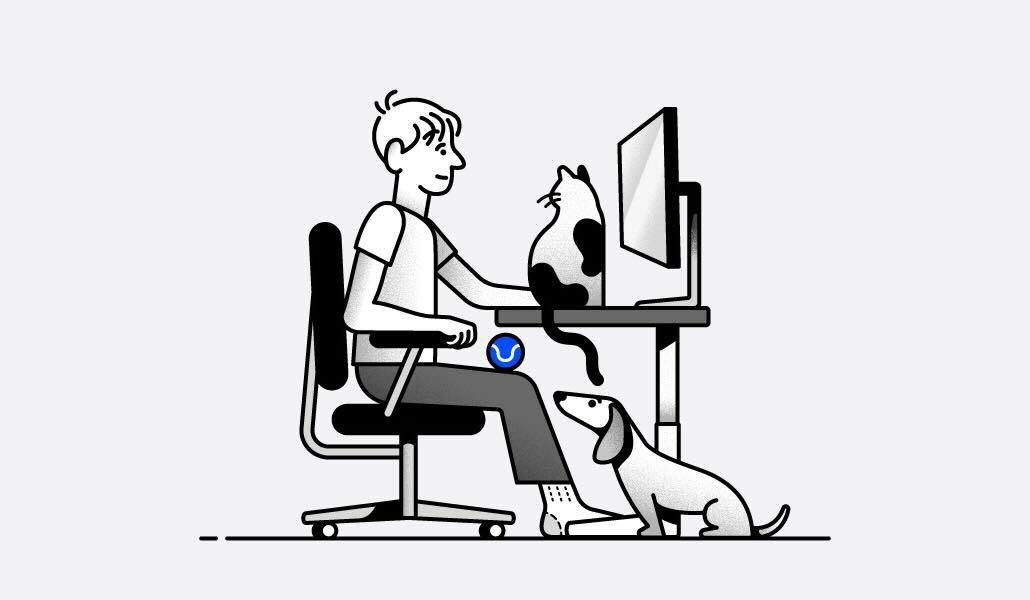Who let the stress out? Why pets-at-work trend is a pressure reliever, productivity booster

You wouldn’t think that the pandemic, and all the strain it brought us, would have a long-term effect on our relationships with animals. But it did.
Not only did more people acquire pets during the last two years (23 million U.S. households welcomed a cat or dog since that start of the coronavirus crisis), but they spent a lot more time with them during that time. And that has changed pet owners’ attitudes towards their furry buddies when it comes to how they fit into their workday.
“People are approaching relationships with their pets differently,” said Banfield Pet Hospital’s chief medical officer Dr. Molly McAllister. With human relations so restricted, owners sought that missing social connection from their pets during the past two years. And whereas before most would have left their cat or dog at home and hired dog walkers — now they don’t want to part with them at all, whether they’re at work or not.
“In fact, 80% of owners [surveyed by Banfield Pet hospital] say they were able to bond with their pet more during this time,” said Dr. McAllister. “Because of this increased connection, 63% say they’re thinking more about how their pets can fit into their workday and 57% agree they’ll be most happy returning to their workplace if they can bring their pets with them.”
The idea of returning to a physical workplace without being able to bring pets has already caused an outbreak of separation anxiety among pet owners. But employers have responded in kind, with many extending their return-to-office policies to be feline and canine inclusive.
Several high-profile companies have adopted pet-friendly policies, including Amazon, where as many as 8,000 dogs can be found every day at the company’s Seattle headquarters; and Zynga, the gaming outfit named after the pet bulldog of founder Mark Pincus.
Meanwhile, all dogs that accompany their owners to Google’s 70 office sites worldwide have been affectionately named Dooglers. The tech giant has also constructed a dog park at its Mountain View campus called The Doogleplex.
The animals have even been embraced in the company’s code of conduct: “Google’s affection for our canine friends is an integral facet of our corporate culture. We like cats, but we’re a dog company…”
The move is a development that Dr. Kenneth Martin, at Northwell Health supports. “We have seen great success from therapy dogs and emotional support animals at the hospital and I’d love to see more companies adopt pet-friendly workplaces.”
Pandemic made human-pet bonds deeper
The connection between humans and animals grew deeper during the pandemic. Medical professionals, in particular, had a grueling time. Dr. Martin, a professional at Northwell Health, was among them. His routine was chaotic at the height of the pandemic. But in March 2020 he adopted two kittens, and they helped him through the hardest times.
“They warmly greeted me every time I came home from a long shift and kept me company during times of social distancing,” he said. “Studies have shown that pets are great for stress relief and mental health. Animals are compassionate and express unconditional love in a way that many humans cannot. It is great to know that I have my two cats, Frank and Mo, waiting for me at home.”
Naturally, the events of the past two years led to tensions among human relationships as free movement was restricted. A telling finding from the Banfield research, was that 76% of the 1,000 people who obtained a dog or cat during Covid preferred spending time with their pet over their partner, friends or family.
A similar result came from a poll conducted for the national pet care organization Wag! In the survey of 1,001 people, 41% responded that when returning to work, they’ll miss their dogs more than their kids or spouses.
And pet lovers are willing to put their money where their hearts are. In an assessment of 2,000 employed pet owners, commissioned for the online veterinarian appointment service Vester, concluded that seven in 10 are willing to accept a pay cut if they’re able to bring their pets to work, while six in 10 quit their jobs instead of returning to an office that wasn’t pet-friendly.
Stress relief leads to higher productivity
Researchers have also learned that the social support and stress tonic pets provide directly leads to productivity increases.
In 2012, Virginia Commonwealth University ran lab tests on the saliva of factory workers in North Carolina where over 500 employees and nearly three dozen dogs were present every day. The researchers discovered a dramatic drop in the stress hormone for employees who brought their dogs to the office compared with those who didn’t, and workers as a whole had higher job satisfaction than industry norms.
Dr. Martin is adamant his cats make him happier, calmer and that in turn helps him focus better on tasks. “They may not understand your stress, but they are supportive nonetheless. When I am feeling overwhelmed, I like to take a minute and just hold my cats or rub their bellies,” he said. “It provides an instant calming sensation and allows me to take a breath and put everything into perspective.”
